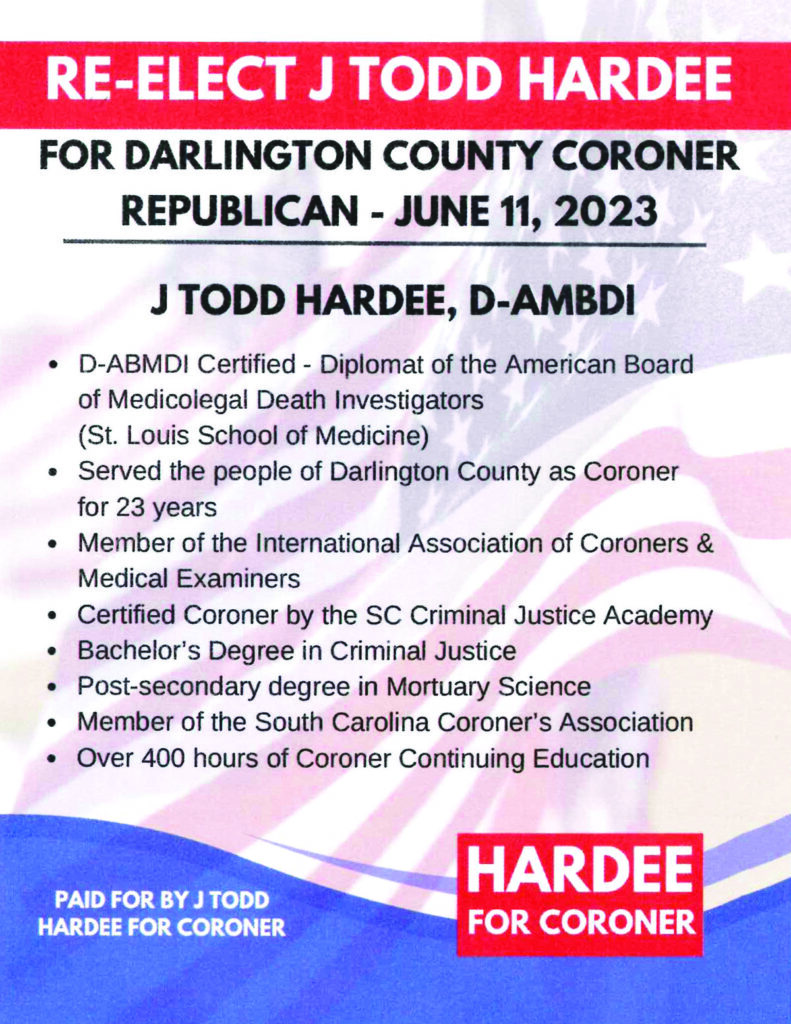WWII pilot recalls award-winning mission


James Bradley Law (back row, third from left) flew 28 combat missions with “the Nichols Crew”.
By Samantha Lyles, Staff Writer, slyles@newsandpress.net
Though it’s been 72 years since James Bradley Law sat behind the yoke of a B-24 bomber, his memories of serving as a co-pilot during World War II remain lucid and engaging.
Law, 95, was born in Darlington on Cashua Street, and recalls having a very happy childhood, full of family warmth, horseplay with friends, and adventures roaming the streets of his hometown. A desire to pursue farming led him to college in Oklahoma, but – like many patriotic young men – Law enlisted in the U.S. Army Air Corps after the bombing of Pearl Harbor.
Assigned to the 7th Air Force in the Pacific Theater, Law flew 28 combat missions and earned several commendations, including the Distinguished Flying Cross.



James Bradley Law displays some of his WWII commendations, including the Distinguished Flying Cross. Photo by Samantha Lyles
One of his clearest memories is of his 28th combat mission in the spring of 1945, where the crew observed two Japanese ships side-by-side at Truk Island, the western Pacific hub for the Imperial Japanese Fleet.
“There were two ships right together, and we come down from about 10,000 or 15,000 feet. We had three 1,000 pound bombs to drop. And when we started down, we could see the Japanese anti-aircraft guns going off because their powder made a lot of smoke,” says Law. “One thing that is like the war movies is that when the bombardier drops the bombs, he says ‘bombs away!’ And that’s the signal for the pilot to get out of there, because you’ve been flying straight and level for two minutes while the bombardier sets his mysterious bomb sight.”
He explains that the sight was “mysterious” because it was initially such a high-tech secret that it was removed from the plane after every mission and escorted by armed guards to a locked facility.
“And once the bombs were away, I just got a quick glimpse of two ships with 1,000 pound bombs going off in shallow water. Mud and water came boiling up, making circles around the sides of the ships. All three hit just perfect, all in a split second, at 200 miles an hour. That’s 300 feet a second, so a half a second difference and we would have missed them by 150 feet,” Law says.
After this final mission, Law received the Distinguished Flying Cross, though he didn’t actually get the medal until 45 years later when his daughter, Mary Haskell, made inquiries and enlisted the aid of Senator Strom Thurmond. Mary presented the medal to her dad as a Christmas present in 1992, and Law keeps it close to him today, framed on a shelf in his room at the Oakhaven Nursing Center.
Law says that the medal is a great honor, but feels that he didn’t perform any outstanding service; he insists that he “just had a few stokes of good luck.” He is quick to give most of the credit to his flight crew, especially their leader and pilot Lt. Nichols, whom he describes as “a natural born pilot, just 26 years old, and a Yankee from New York City.”
Law still regrets that he wasn’t able to join his fellow flyers for the invasion of Okinawa. Shortly before that mission, Law rushed down the runway to aid in rescue efforts when a bomber overshot the landing strip and submerged in water. He sustained a knee injury and was not allowed to rejoin his crew. Law says the actual sprint along the asphalt was likely the last straw for his knees, and recalls that he had always been reckless during his youth, doing daredevil feats like jumping out of high trees into Black Creek. Countless “duck walking” exercises during Army physical training probably didn’t help matters, either, he observes.
After being discharged from the service, Law pursued a career in farming, but wound up retiring from the U.S. Postal Service. Though his health now requires nursing care, Law still enjoys discussing his time in the service with family and friends, and the tales remain as gripping and impressive as ever. Though when Law is told as much, he simply shakes his head.
“I still say I was just lucky,” he says.


